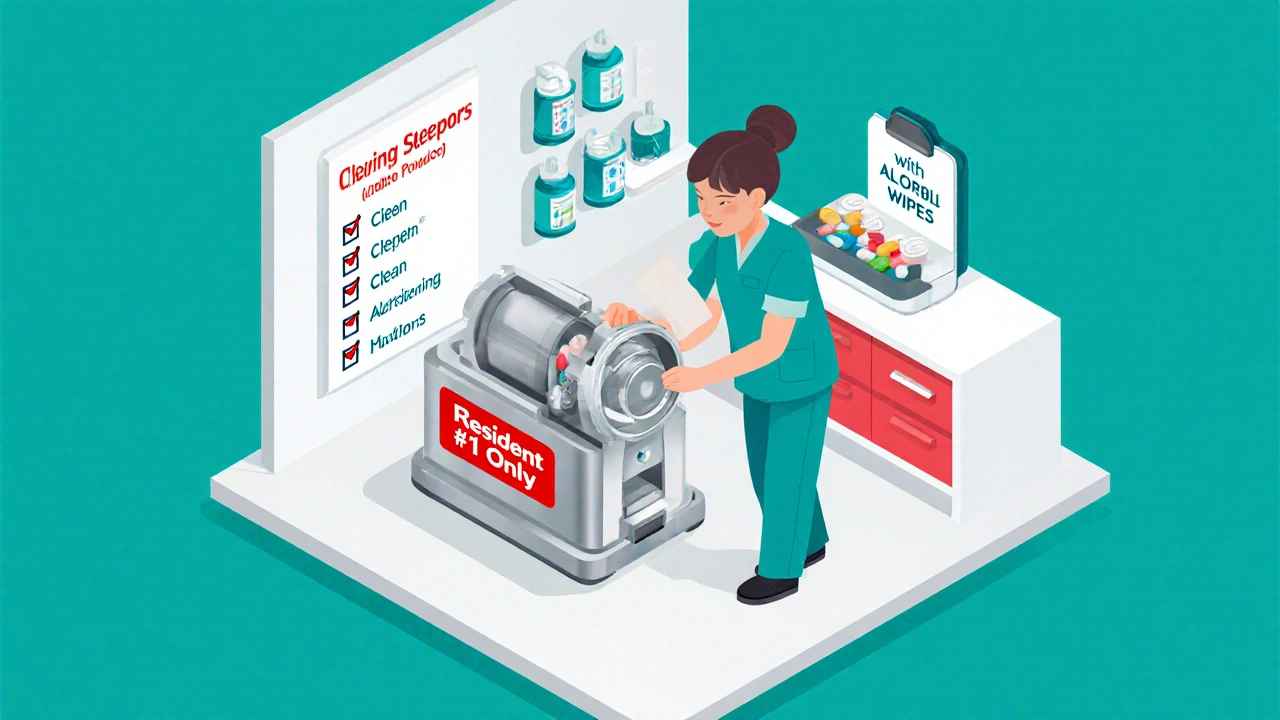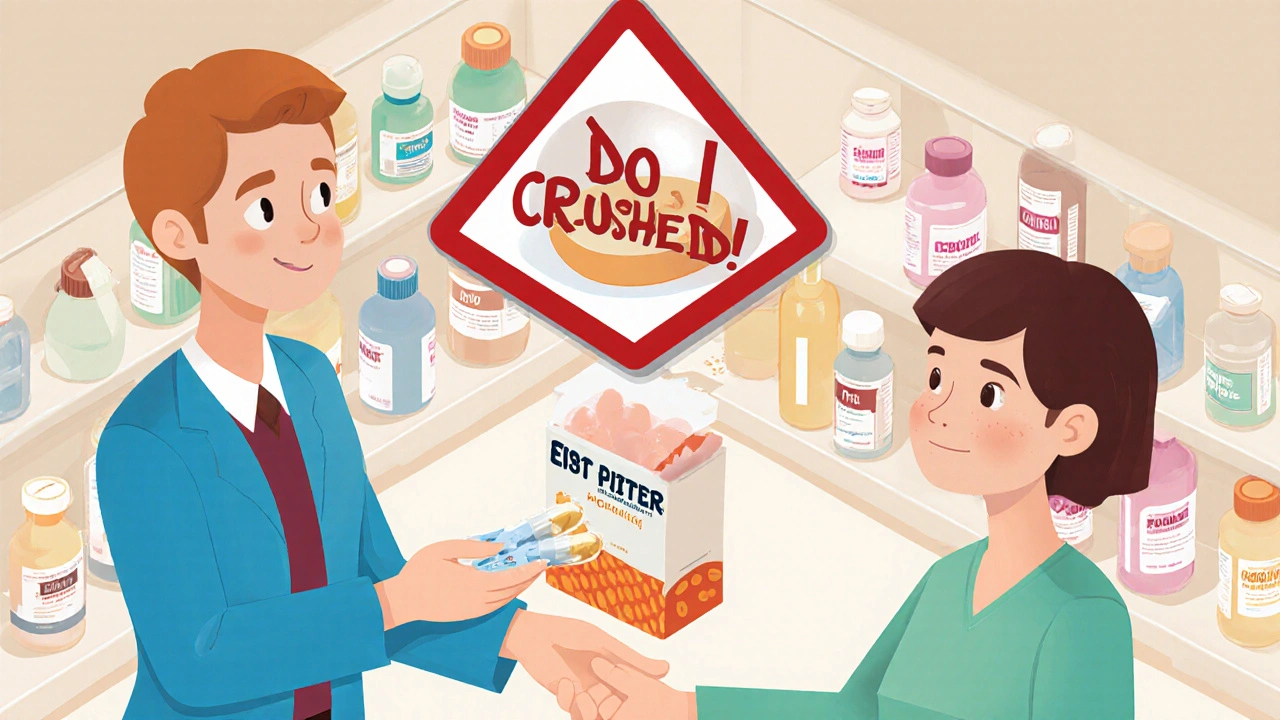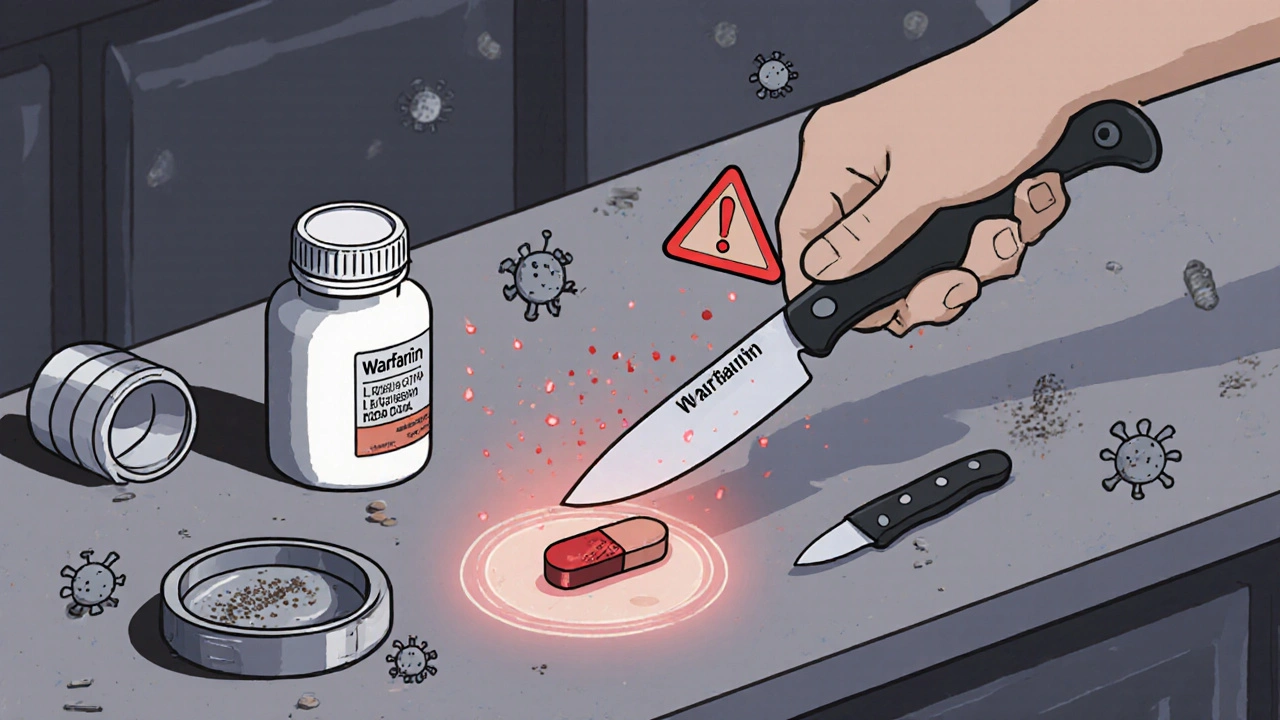Splitting or crushing pills might seem like a simple fix-maybe you’re trying to save money, make it easier to swallow, or adjust a dose. But if you do it wrong, you could be putting yourself or someone you care for at serious risk. Contamination, uneven doses, and dangerous exposure to toxic drugs aren’t just theoretical risks-they’ve caused real harm. In 2023, a care home in Ohio saw 14 residents affected by warfarin cross-contamination because one pill splitter was used for multiple medications without cleaning. That’s not an isolated case. The medication contamination problem is bigger than most people realize.
Why This Isn’t Just About Clean Hands
It’s easy to think, “I just used a knife and wiped it off.” But pills aren’t like bread. They’re engineered with specific coatings, time-release layers, and chemical compounds that can become hazardous when disturbed. The FDA says 97.8% of extended-release, enteric-coated, or hazardous drugs should never be crushed or split. That includes common medications like warfarin, levothyroxine, cyclophosphamide, and many cancer drugs. If you crush a pill with a hazardous coating, tiny particles can become airborne. A 2019 study found healthcare workers’ gloves had up to 4.7 ng/cm² of cyclophosphamide residue after open crushing-enough to cause long-term health risks. Even if you’re not handling chemo drugs, cross-contamination between medications can change how a drug works. A single split tablet of levothyroxine contaminated with warfarin can throw off blood clotting levels, leading to strokes or internal bleeding.What You Should Never Split or Crush
Not all pills are created equal. Before you even reach for a knife or a splitter, check the label. If it says “extended-release,” “sustained-release,” “enteric-coated,” or “SR,” leave it whole. These pills are designed to release medicine slowly over hours. Crush them, and you get a full dose all at once-potentially an overdose. Also avoid splitting or crushing:- Any pill labeled “DO NOT CRUSH” or “DO NOT SPLIT”
- Tablets with a film coating (unless approved by a pharmacist)
- Capsules-never open them unless the label says it’s safe
- Hazardous drugs (NIOSH List 1 and 2), including many chemotherapy agents
- Pills that crumble easily or have uneven shapes
The Right Tools Make All the Difference
If your doctor or pharmacist says it’s safe to split a pill, use the right tool. A kitchen knife, scissors, or your fingernails are not acceptable. These methods lead to uneven splits and leave behind residue. Use a dedicated pill splitter with a stainless steel blade and a v-shaped holder. Models like the Med-Plus Pro or Silent Knight are designed to hold the pill firmly and cut it cleanly within a 0.05mm tolerance. These tools are built to prevent the pill from rolling or shifting during the cut, which reduces dose variability. For crushing, use a closed-system pill crusher. The Silent Knight, for example, traps over 99.8% of powder inside a sealed container. Open crushing-like using a mortar and pestle or crushing in a plastic bag-lets fine particles escape. In a 2022 study, closed-system crushers reduced hazardous drug exposure by 89.2% compared to open methods.
Cleaning Between Uses Is Non-Negotiable
One of the biggest mistakes? Using the same splitter or crusher for multiple medications without cleaning. A 2023 survey found only 34.6% of care home staff cleaned their pill splitters between different drugs. That’s dangerous. Warfarin residue on a splitter can contaminate thyroid medication. Antidepressant powder can mix with diabetes pills. The results? Unpredictable effects, hospitalizations, even deaths. Here’s the clean protocol:- Wash your hands thoroughly before handling any medication.
- Wear disposable gloves-don’t reuse them.
- After each use, wipe the splitter or crusher with a 70% isopropyl alcohol wipe.
- Let it air dry completely before storing.
- Never share equipment between patients unless it’s been professionally sterilized.
Don’t Pre-Split Your Entire Supply
It’s tempting to split a month’s worth of pills at once and store them. Don’t. The FDA explicitly warns against this. Once you break the tablet’s coating, moisture, light, and air can degrade the medication. A split tablet of levothyroxine loses up to 12% of its potency in just seven days. That’s enough to cause under-treatment. Always split pills right before taking them. If you need to split a daily dose, do it the same day. Store the whole pill in its original container until you’re ready. If you’re using a pill organizer, only put in the whole pill-split it right before swallowing.Pharmacists Are Your Best Resource
Many people don’t realize pharmacists are trained to help with this exact issue. If you’re struggling to swallow pills, ask if there’s a liquid form. If you need a lower dose, ask if a different strength is available. Most pharmacies carry 10mg, 5mg, and 2.5mg versions of common medications. A 2022 JAMA Internal Medicine study showed that pharmacist-led education reduced splitting errors by 58.3% in Medicare patients. That’s not a small number. Pharmacists know which pills can be split, which need special equipment, and which should be avoided entirely. They also know how to flag your electronic health record so nurses and caregivers see “DO NOT SPLIT” in bold. Don’t be afraid to ask: “Is this pill safe to split?” or “Do you have a smaller dose?”
What If You’ve Already Been Doing It Wrong?
If you’ve been crushing pills with a spoon or splitting them with scissors, don’t panic-but do act. Stop immediately. Check the labels on all your medications. Look for any that say “extended-release,” “SR,” or “DO NOT CRUSH.” Contact your doctor or pharmacist. Tell them what you’ve been doing. They can:- Switch you to a different formulation
- Prescribe a lower-strength tablet you can take whole
- Recommend a liquid alternative
- Provide a proper pill splitter or crusher
What About Home Caregivers?
If you’re caring for a loved one, you’re not alone. A 2023 survey found 41.7% of home caregivers didn’t know about cross-contamination risks. That’s alarming. Here’s what you need to do:- Get training from the pharmacy or home health agency
- Use a dedicated splitter for each person
- Keep a log: which pill was split, when, and by whom
- Never use the same tool for different meds without cleaning
- Report any signs of unexpected side effects-dizziness, bleeding, confusion-to a doctor right away
The Bigger Picture: Why This Matters
Improper pill splitting and crushing contribute to 8.3% of medication errors in long-term care, according to the Agency for Healthcare Research and Quality. That’s tens of thousands of preventable incidents every year. But it’s not just about numbers. It’s about people. A man in his 70s took a split warfarin tablet that had been contaminated with levothyroxine. He didn’t know why he was suddenly dizzy and weak. His doctor didn’t suspect it until a pharmacist noticed the splitter had been used for both drugs. He ended up in the hospital with a dangerously low heart rate. This isn’t about being perfect. It’s about being informed. You don’t need to be a pharmacist to do this safely. You just need to know the rules-and follow them.Can I split pills with a knife or scissors?
No. Knives and scissors cause uneven splits and leave behind residue that can contaminate other medications. They also increase the risk of injury. Always use a dedicated pill splitter with a stainless steel blade designed for medication.
Is it safe to crush pills for someone who can’t swallow them?
Only if a pharmacist or doctor confirms the pill is safe to crush. Many medications, especially extended-release or hazardous drugs, become dangerous when crushed. Always ask first. Liquid forms or dissolvable tablets are safer alternatives.
How often should I clean my pill splitter?
Clean it with a 70% isopropyl alcohol wipe after every single use, especially when switching between different medications. Never reuse the same splitter for multiple drugs without cleaning. For shared use in care homes, each resident should have their own labeled device.
Can I split pills ahead of time and store them?
No. The FDA advises against pre-splitting. Once a tablet is split, exposure to air and moisture can reduce its potency. Some medications, like levothyroxine, lose effectiveness within days. Always split pills right before taking them.
What should I do if I accidentally crushed a pill that shouldn’t be crushed?
Stop using the medication immediately. Contact your pharmacist or doctor. If it’s a hazardous drug, avoid inhaling dust or touching your face. Wash your hands thoroughly and clean any surfaces that may have been exposed. Report the incident-even if you think nothing happened. It’s better to be safe.
